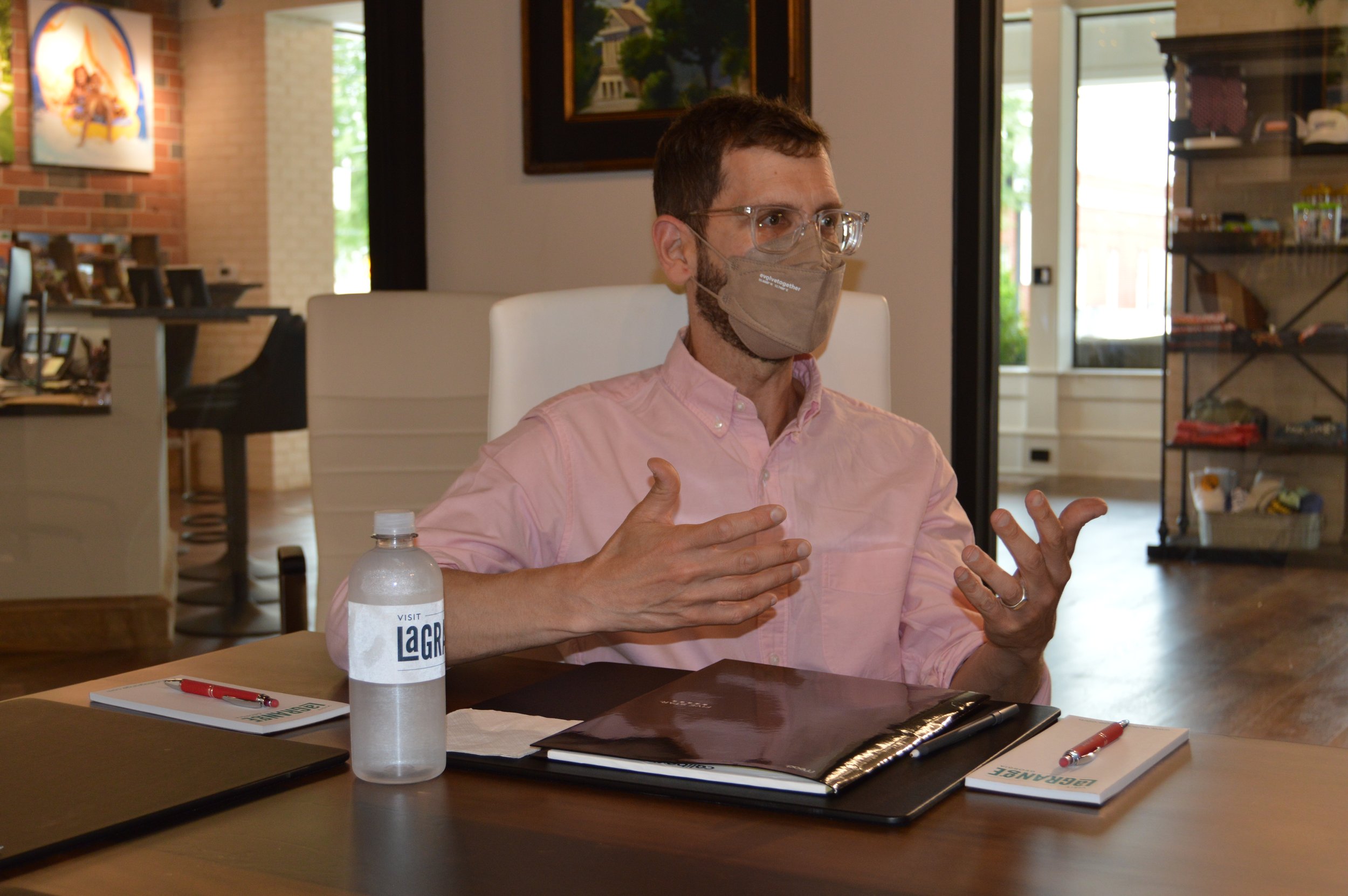Walk the Walk: How Three Police Chiefs Defied the Odds and Changed Cop Culture
Author Neil Gross interviews Trustbuilding Board members about the impact of the LaGrange Police Department
on our community through the Trustbuilding Initiative. Professor Gross met us at Visit LaGrange on June 28, 2022.
The book has since been finalized and released in March 2023. Pretty Good Books in LaGrange has some copies of Neil’s book.
With “Walk the Walk,” Neil Gross Offers Examples of Police Reform
The sociology professor’s latest book puts him at the center
of an evolving national conversation
ABOUT NEIL GROSS: Neil Louis Gross is the Charles A. Dana Professor of Sociology and chair of the Department of Sociology at Colby College. He is also a visiting scholar of New York University’s Institute for Public Knowledge. He has written several books on sociological and political topics, and also blogs for The Chronicle of Higher Education. Gross edited the American Sociological Association's journal Sociological Theory from 2009 to 2015. He previously taught at the University of Southern California, Harvard University, Princeton University, and at the University of British Columbia.
Neil Gross, the Charles A. Dana Professor of Sociology, will publish his latest public policy research in Walk the Walk: How Three Police Chiefs Defied the Odds and Changed Cop Culture. The book details how three police departments tackled internal police department culture and changed how they operate. Gross is a former policeman turned college professor.
An article published in COLBY NEWS By Bob Keyes Photography by Gabe Souza
February 21, 2023
Colby sociology professor and former patrol officer Neil Gross is becoming a go-to source for the national news media in their search for experts who can discuss and analyze police-reform efforts ongoing across the country.
In the wake of the beating and death of Tyre Nichols by Memphis police officers after a traffic stop in late January, Gross has been quoted in the New York Times, interviewed for a podcast hosted by The New Statesman, and he contributed an essay to The Atlantic. On March 21 Metropolitan Books, an imprint of Henry Holt & Co., will publish his widely anticipated research on the topic, Walk the Walk: How Three Police Chiefs Defied the Odds and Changed Cop Culture.
His premise, he writes in the introduction, is simple: Policy changes are vital to reforming police departments. “But to fix policing, we need to change cop culture: the values, beliefs, and assumptions, the worldview of those in law enforcement. Right now, not enough people are talking about how to do that.”
Walk the Walk offers a roadmap for those willing to try.
Gross, the Charles A. Dana Professor of Sociology, highlights what he calls “a new spirit of police work” at three departments around the country: Stockton, Calif.; Longmont, Colo.; and LaGrange, Ga. In each of those communities, police chiefs replaced traditional policing with new models that focused on equity, responsibility, reconciliation, and—ultimately—the preservation of life.
A former police officer in Berkeley, Calif., Gross wrote the book because he wanted to share the sense of hope that he has about the future of policing in the United States. “Many Americans have lost faith in policing and other institutions. There is a sense that these institutions are failing, that they are inadequate, and that they are not living up to the moment. There is a fatalism associated with that idea, that this is just how things are and how they always will be,” he said in an interview.
“I want to suggest that change is possible. Law enforcement has changed considerably over the years, and we can push to do it better. I want to revive the conversation around police reform and get communities to think about what that looks like.”
In Stockton, a mid-size city in central California plagued by gang violence and generational distrust between residents and law enforcement, Police Chief Eric Jones reformed his department by hiring “new-school” recruits to replace old-school officers, who had operated with an all-stick, no-carrot attitude. Jones embraced a contemporary approach to policing known as procedural justice. It embodies fairness and transparency in the criminal justice process, including the work of street cops, and is premised on trust, communication, and the idea “that all citizens should be treated with respect.”
In Longmont, a city of 100,000 people northeast of Boulder, now-retired Police Chief Mike Butler implemented many reforms activists are seeking nationally. Among them is the practice of restorative justice. Instead of arresting people and putting them in jail, officers work with a community group to arrange meetings between victims and offenders so they can talk and try to find mutual understanding. “The results are impressive: crime rates have fallen without resorting to heavy-handed tactics, and the police are seen by locals as contributing to the social good,” Gross writes.
And in LaGrange, “a pencil dot on the map not far from the Alabama state line,” Police Chief Lou Dekmar refashioned a racist department with a blighted past into one focused on reconciliation and equity, where officers are trained to shoot to incapacitate when they can and not to kill. “There is a whole set of changes he has made to professionalize that department that is uncommon elsewhere,” Gross said. Among other things, Dekmar publicly apologized for a lynching in 1940 in which his department was complicit.
Gross had the full cooperation of each department he portrays in Walk the Walk. They were transparent and cooperative, sharing body camera footage when he requested it and granting him ride-alongs and access to people and records.
A former officer, he was on the force in Berkeley for 11 months before the disconnect between what he expected the job to be and what he saw on the streets prompted him to return to school. Streetwise and sympathetic, Gross ably conveys the stories of these departments, their officers, and leaders with the credibility of a cop and the perspective of a sociologist.
In that sense, Walk the Walk feels more like narrative nonfiction than an academic analysis. It’s full of data and documentation, but Gross wrote it for a general audience with character development, dialogue, and a storytelling style that focuses on humanity over policy.
That has been his motivation at Colby since he arrived in 2015. His students study important topics bubbling up in society, including policing, criminal justice, and free speech. Among the courses he has introduced is Policing the American City, which compares law enforcement now to 20 and 30 years ago.
“I want to make sure that in addition to teaching standard bread-and-butter issues of sociology, we are also thinking about the important issues of the day,” he said. “We want to get students thinking about how to be informed citizens of the world.”
Prior to joining Colby, Gross taught at Princeton, the University of British Columbia, Harvard, and the University of Southern California. His previous books are Why Are Professors Liberal and Why Do Conservatives Care? (Harvard University Press, 2013) and Richard Rorty: The Making of an American Philosopher (University of Chicago Press, 2008).
Gross had research help from Ivan Knoepflmacher ’24, Katie Queally ’21, Amber Churchwell ’20, and Tara Strelevitz ’20. In addition to his students, he acknowledges the support of the College administration, the Goldfarb Center for Public Affairs, faculty, and staff. He writes in the book, “I am lucky to work at Colby, whose commitment to truth-seeking on issues vital to our democracy is second to none.”









